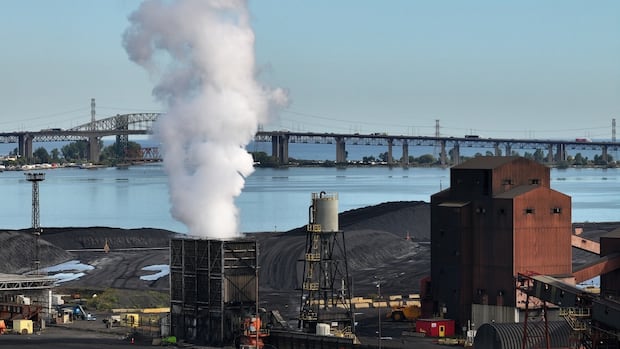
How would federal parties handle the industrial carbon tax? Climate-focused voters in Hamilton want to know
CBC
The Liberal government has already cancelled the consumer carbon tax, but the issue of carbon pricing for industrial pollution is still on the table in the current federal election campaign.
The system, which varies slightly by province, makes large emitters pay into a fund that subsidizes projects to reduce industrial emissions. The Conservatives say that, if elected, they'd get rid of it.
That would mean an end to a source of funds that helps pay for projects like the green steel plans at ArcelorMittal Dofasco, says Ian Borsuk, executive director of Environment Hamilton. He says that with no financial incentive to reduce pollution, it's likely that many businesses would abandon plans to improve their emissions, further escalating global warming.
Borsuk says the issue is particularly salient in Hamilton, where residents are faced with industrial emissions that contain known chemicals that negatively impact human health. These include sulfur dioxide, nitrogen dioxide, and benzo(a)pyrene, a carcinogen found in levels higher than provincial guidelines in all urban areas of Hamilton.
"I find it hard to believe the average Canadian is wanting a local employer and business not to improve their environmental practices, and not reduce emissions, that in turn, helps their own health," says Borsuk.
"If we want to have clean air, that is a direct benefit" of the carbon tax for industry, he says. "Without an industrial carbon tax … there's no incentive for those companies to make these changes that really benefit all of us."
An industrial carbon price has been a key part of the Liberal government's plan to tackle climate change, giving economic incentives to reduce emissions — by both carrot and stick. Large-scale emitters have thresholds for how carbon-intensive their operations can be. Those that exceed it have to pay. Those that produce less carbon pollution than allowed can profit by having surplus credits to sell.
Currently, the federal government directly administers the pricing system in Manitoba, Prince Edward Island, Nunavut and Yukon. All other provinces, including Ontario, run their own programs, but they need to comply with federal standards on the price put on companies and how the money is used.
An independent analysis last year found it the most effective part of the government's policies to lower emissions in Canada, and industrial voices were publicly supporting it — until recently.
The Conservatives say they would remove the federal requirement, leaving it to provinces to run their own pricing systems if they choose, and expand federal tax credits aimed at clean technology and manufacturing.
For some voters who identify climate change and the environment as among their top concerns, cancelling the carbon tax for industry is a non-starter.
"An industrial tax has the potential [to] play a much larger role than the consumer carbon tax ever could" when it comes to creating a more sustainable country, said Dundas resident Kris Gadjanski, 58. "For me, voting for a person who promises to eliminate the industrial carbon tax would be foolish and short-sighted, and is simply not an option."
St. Catharines resident Andrew Stewart says he would have preferred to keep the consumer carbon tax as well.
"We need more tools to combat climate change, not fewer," said Stewart, 35. "While imperfect, I think the Liberals did a very bad job communicating the purpose and value of the tax-rebate system, and the Conservatives did a very good job vilifying it."

Talking politics with family and friends? Start with curiosity and respect, says P.E.I. psychologist
The federal election is coming up on April 28, and campaigns can stir up lots of opinion and emotions.





















 Run 3 Space | Play Space Running Game
Run 3 Space | Play Space Running Game Traffic Jam 3D | Online Racing Game
Traffic Jam 3D | Online Racing Game Duck Hunt | Play Old Classic Game
Duck Hunt | Play Old Classic Game










